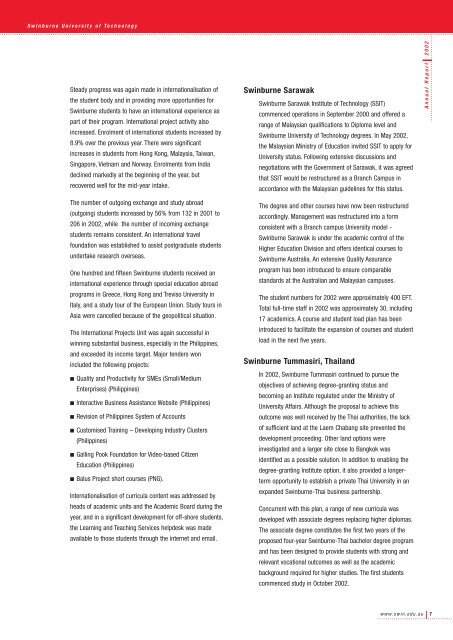Annual Report - Swinburne University of Technology
Annual Report - Swinburne University of Technology
Annual Report - Swinburne University of Technology
You also want an ePaper? Increase the reach of your titles
YUMPU automatically turns print PDFs into web optimized ePapers that Google loves.
<strong>Swinburne</strong> <strong>University</strong> <strong>of</strong> <strong>Technology</strong><br />
Steady progress was again made in internationalisation <strong>of</strong><br />
the student body and in providing more opportunities for<br />
<strong>Swinburne</strong> students to have an international experience as<br />
part <strong>of</strong> their program. International project activity also<br />
increased. Enrolment <strong>of</strong> international students increased by<br />
8.9% over the previous year. There were significant<br />
increases in students from Hong Kong, Malaysia, Taiwan,<br />
Singapore, Vietnam and Norway. Enrolments from India<br />
declined markedly at the beginning <strong>of</strong> the year, but<br />
recovered well for the mid-year intake.<br />
The number <strong>of</strong> outgoing exchange and study abroad<br />
(outgoing) students increased by 56% from 132 in 2001 to<br />
206 in 2002, while the number <strong>of</strong> incoming exchange<br />
students remains consistent. An international travel<br />
foundation was established to assist postgraduate students<br />
undertake research overseas.<br />
One hundred and fifteen <strong>Swinburne</strong> students received an<br />
international experience through special education abroad<br />
programs in Greece, Hong Kong and Treviso <strong>University</strong> in<br />
Italy, and a study tour <strong>of</strong> the European Union. Study tours in<br />
Asia were cancelled because <strong>of</strong> the geopolitical situation.<br />
The International Projects Unit was again successful in<br />
winning substantial business, especially in the Philippines,<br />
and exceeded its income target. Major tenders won<br />
included the following projects:<br />
■ Quality and Productivity for SMEs (Small/Medium<br />
Enterprises) (Philippines)<br />
■ Interactive Business Assistance Website (Philippines)<br />
■ Revision <strong>of</strong> Philippines System <strong>of</strong> Accounts<br />
■ Customised Training – Developing Industry Clusters<br />
(Philippines)<br />
■ Galling Pook Foundation for Video-based Citizen<br />
Education (Philippines)<br />
■ Balus Project short courses (PNG).<br />
Internationalisation <strong>of</strong> curricula content was addressed by<br />
heads <strong>of</strong> academic units and the Academic Board during the<br />
year, and in a significant development for <strong>of</strong>f-shore students,<br />
the Learning and Teaching Services helpdesk was made<br />
available to those students through the internet and email.<br />
<strong>Swinburne</strong> Sarawak<br />
<strong>Swinburne</strong> Sarawak Institute <strong>of</strong> <strong>Technology</strong> (SSIT)<br />
commenced operations in September 2000 and <strong>of</strong>fered a<br />
range <strong>of</strong> Malaysian qualifications to Diploma level and<br />
<strong>Swinburne</strong> <strong>University</strong> <strong>of</strong> <strong>Technology</strong> degrees. In May 2002,<br />
the Malaysian Ministry <strong>of</strong> Education invited SSIT to apply for<br />
<strong>University</strong> status. Following extensive discussions and<br />
negotiations with the Government <strong>of</strong> Sarawak, it was agreed<br />
that SSIT would be restructured as a Branch Campus in<br />
accordance with the Malaysian guidelines for this status.<br />
The degree and other courses have now been restructured<br />
accordingly. Management was restructured into a form<br />
consistent with a Branch campus <strong>University</strong> model -<br />
<strong>Swinburne</strong> Sarawak is under the academic control <strong>of</strong> the<br />
Higher Education Division and <strong>of</strong>fers identical courses to<br />
<strong>Swinburne</strong> Australia. An extensive Quality Assurance<br />
program has been introduced to ensure comparable<br />
standards at the Australian and Malaysian campuses.<br />
The student numbers for 2002 were approximately 400 EFT.<br />
Total full-time staff in 2002 was approximately 30, including<br />
17 academics. A course and student load plan has been<br />
introduced to facilitate the expansion <strong>of</strong> courses and student<br />
load in the next five years.<br />
<strong>Swinburne</strong> Tummasiri, Thailand<br />
In 2002, <strong>Swinburne</strong> Tummasiri continued to pursue the<br />
objectives <strong>of</strong> achieving degree-granting status and<br />
becoming an Institute regulated under the Ministry <strong>of</strong><br />
<strong>University</strong> Affairs. Although the proposal to achieve this<br />
outcome was well received by the Thai authorities, the lack<br />
<strong>of</strong> sufficient land at the Laem Chabang site prevented the<br />
development proceeding. Other land options were<br />
investigated and a larger site close to Bangkok was<br />
identified as a possible solution. In addition to enabling the<br />
degree-granting Institute option, it also provided a longerterm<br />
opportunity to establish a private Thai <strong>University</strong> in an<br />
expanded <strong>Swinburne</strong>-Thai business partnership.<br />
Concurrent with this plan, a range <strong>of</strong> new curricula was<br />
developed with associate degrees replacing higher diplomas.<br />
The associate degree constitutes the first two years <strong>of</strong> the<br />
proposed four-year <strong>Swinburne</strong>-Thai bachelor degree program<br />
and has been designed to provide students with strong and<br />
relevant vocational outcomes as well as the academic<br />
background required for higher studies. The first students<br />
commenced study in October 2002.<br />
<strong>Annual</strong> <strong>Report</strong> 2002<br />
www.swin.edu.au<br />
7

















